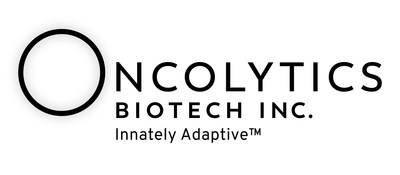Oncolytics Biotech® Doses First Patient in Phase 2 IRENE Study Evaluating Pelareorep-anti-PD-1 Combination Treatment in Triple-Negative Breast Cancer
Rhea-AI Summary
Oncolytics Biotech has initiated the IRENE study, a phase 2 trial examining the combination of pelareorep and Incyte's anti-PD-1 checkpoint inhibitor, retifanlimab, in treating unresectable locally advanced or metastatic triple-negative breast cancer (TNBC). The first patient has been dosed as part of this multi-center study, co-sponsored with Rutgers Cancer Institute and The Ohio State University. The trial aims to assess safety, efficacy, PD-L1 expression changes, and T cell clonality. This innovative approach addresses the urgent need for effective treatments in the aggressive TNBC subtype.
Positive
- Initiation of phase 2 IRENE study for pelareorep in TNBC.
- First patient dosed, indicating progress in clinical development.
- Study explores safety, efficacy, and biomarkers for treatment outcomes.
Negative
- TNBC has a poor prognosis and limited treatment options.
News Market Reaction 1 Alert
On the day this news was published, ONCY declined 0.56%, reflecting a mild negative market reaction.
Data tracked by StockTitan Argus on the day of publication.
- Expansion of Oncolytics' lead breast cancer program into a new disease subtype
- Seek synergies between pelareorep and retifanlimab checkpoint inhibitor
SAN DIEGO, Calif. and CALGARY, Alberta, Aug. 26, 2020 /PRNewswire/ -- Oncolytics Biotech® Inc. (NASDAQ: ONCY) (TSX: ONC) today announced the first patient has been dosed in the Company's investigator-sponsored phase 2 study of pelareorep-anti-PD-1 combination therapy in unresectable locally advanced or metastatic triple-negative breast cancer (TNBC). The study, known as IRENE, is co-sponsored by Oncolytics, the Rutgers Cancer Institute of New Jersey, and Incyte. Participants in the multi-center study receive pelareorep in combination with Incyte's anti-PD-1 checkpoint inhibitor retifanlimab (INCMGA00012).

The recently announced IRENE study builds on prior clinical data showing pelareorep-induced priming of an adaptive immune response in multiple breast cancer subtypes. In addition to investigating the safety and efficacy of pelareorep-anti-PD-1 combination treatment in TNBC patients, the study will also evaluate changes in PD-L1 expression and correlations between treatment outcomes and peripheral T cell clonality, a previously identified biomarker of pelareorep response that may enable the success of future registrational trials by facilitating study design and patient selection. The trial will take place at the Rutgers Cancer Institute of New Jersey and The Ohio State University Comprehensive Cancer Center.
Principal investigator Mridula George, M.D., Medical Oncologist, Rutgers Cancer Institute of New Jersey and Assistant Professor of Medicine, Rutgers Robert Wood Johnson Medical School, commented, "The paucity of treatment options in metastatic triple-negative breast cancer combined with its aggressive clinical behavior results in a poorer prognosis when compared to other subtypes of breast cancer. This is an exciting study to evaluate the role of immunomodulation in the tumor microenvironment as a treatment option. I'm looking forward to getting this study underway to potentially make an impact in the lives of patients affected with metastatic triple-negative breast cancer."
For more information about the IRENE study, refer to ClinicalTrials.gov (NCT04445844).
About IRENE
The IRENE (INCMGA00012 and the oncolytic virus pelareorep in metastatic triple-negative breast cancer) study is a single-arm, open-label, phase 2 study evaluating the combination of pelareorep and INCMGA00012 for the treatment of unresectable locally advanced or metastatic triple-negative breast cancer. The study will enroll 25 patients and will be conducted at the Rutgers Cancer Institute of New Jersey and The Ohio State University Comprehensive Cancer Center.
Study participants will receive pelareorep intravenously on days 1, 2, 15, and 16 of 28-day treatment cycles. INCMGA00012 will be administered on day 3 of each cycle, with treatment cycles continuing until disease progression is observed. The co-primary endpoints of the study are safety and objective response rate. Secondary endpoints include progression free survival, overall survival, and duration of response. Exploratory endpoints include peripheral T cell clonality and pre- vs. post-treatment change in tumor PD-L1 expression.
About Breast Cancer
Breast cancer is the most common cancer in women worldwide, with over two million new cases diagnosed in 2018, representing about 25 percent of all cancers in women. Incidence rates vary widely across the world, from 27 per 100,000 in Middle Africa and Eastern Asia to 85 per 100,000 in Northern America. It is the fifth most common cause of death from cancer in women globally, with an estimated 522,000 deaths.
Breast cancer starts when cells in the breast begin to grow out of control. These cells usually form a tumor that can often be seen on an x-ray or felt as a lump. The malignant tumor (cancer) is getting worse when the cells grow into (invade) surrounding tissues or spread (metastasize) to distant areas of the body.
About Pelareorep
Pelareorep is a non-pathogenic, proprietary isolate of the unmodified reovirus: a first-in-class intravenously delivered immuno-oncolytic virus for the treatment of solid tumors and hematological malignancies. The compound induces selective tumor lysis and promotes an inflamed tumor phenotype through innate and adaptive immune responses to treat a variety of cancers and has been demonstrated to be able to escape neutralizing antibodies found in patients.
About Oncolytics Biotech Inc.
Oncolytics is a biotechnology company developing pelareorep, an intravenously delivered immuno-oncolytic virus. The compound induces selective tumor lysis and promotes an inflamed tumor phenotype -- turning "cold" tumors "hot" -- through innate and adaptive immune responses to treat a variety of cancers.
Pelareorep has demonstrated synergies with immune checkpoint inhibitors and may also be synergistic with other approved immuno-oncology agents. Oncolytics is currently conducting and planning additional studies in combination with checkpoint inhibitors and targeted therapies in solid and hematological malignancies, as it prepares for a phase 3 registration study in metastatic breast cancer. For further information, please visit: www.oncolyticsbiotech.com.
This press release contains forward-looking statements, within the meaning of Section 21E of the Securities Exchange Act of 1934, as amended and forward-looking information under applicable Canadian securities laws (such forward-looking statements and forward-looking information are collectively referred to herein as "forward-looking statements"). Forward-looking statements, including the Company's belief as to the potential and mode of action of pelareorep as a cancer therapeutic, and other statements related to anticipated developments in the Company's business and technologies involve known and unknown risks and uncertainties, which could cause the Company's actual results to differ materially from those in the forward-looking statements. Such risks and uncertainties include, among others, the availability of funds and resources to pursue research and development projects, the efficacy of pelareorep as a cancer treatment, the success and timely completion of clinical studies and trials, the Company's ability to successfully commercialize pelareorep, uncertainties related to the research and development of pharmaceuticals, uncertainties related to the regulatory process and general changes to the economic environment. In particular, we may be impacted by business interruptions resulting from COVID-19 coronavirus, including operating, manufacturing supply chain, clinical trial and project development delays and disruptions, labour shortages, travel and shipping disruption and shutdowns (including as a result of government regulation and prevention measures). It is unknown whether and how the Company may be affected if the COVID-19 pandemic persists for an extended period of time. We may incur expenses or delays relating to such events outside of our control, which could have a material adverse impact on our business, operating results and financial condition. Investors should consult the Company's quarterly and annual filings with the Canadian and U.S. securities commissions for additional information on risks and uncertainties relating to the forward-looking statements. Investors are cautioned against placing undue reliance on forward-looking statements. The Company does not undertake to update these forward-looking statements, except as required by applicable laws.
Company Contact Kirk Look Chief Financial Officer 403.670.7658 | Investor Relations for Oncolytics Timothy McCarthy LifeSci Advisors 212.915.2564 |
SOURCE Oncolytics Biotech® Inc.








